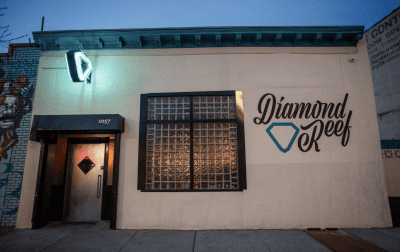Group members (left to right): Moussa Trapee, Duery Gabbidon, Williams Colassaint, Edie Destin, Christian Soberanis, DJ Ouaga, Keith Pitocchi, Eunika Simmons. Photo by Kidist Teffera
Home and Abroad is a joyful monthly Afrocentric drum party with a global outlook
Djembes, güiras, rattles and shakers: The Sultan Room bumps with live beats and eclectic DJ sets every first Friday
It’s pouring at 11 p.m. on the first Friday night of March. A djembe can just be heard tapping out a rhythm from inside a club on the corner of Wyckoff and Starr. In fact, the djembe is just one in a chorus of drums pouring out over an Afro-Caribbean track.
Throughout the night and well into the wee hours of the next morning, this army of percussion will take over The Sultan Room, the late-night performance venue in the heart of Bushwick. The drums will be joined by maracas. Then, by the sultry vocals of Guy Laire, an independent artist from Queens performing in Creole and English. At some point, a beautiful woman clad in florals will pull a güira out of her purse. Beats, hooks and sounds from across the African diaspora will make their presence known. You will travel home and abroad without ever leaving Kings County.
Therapeutic drumming
Home and Abroad is a multi-genre, Afro-centric global dance and drum party. Now in its second year, the event has landed a six-month residency at The Sultan Room, attached to the kitschy roadside Americana of the Turk’s Inn restaurant. On the first Friday of every month, a crew of DJs, percussionists and dancers descends upon the small site, occupying a space between a traditional, DJ-led party and a live concert.
At the center of it all, literally and figuratively, is founder Christian Soberanis. A dancer by trade, Christian identifies as both a lifelong New Yorker and lifelong partier. The pivot to instrumentalist, however, was a natural one.
“Drumming is really like an extension of dance for me,” he says. “Because you’re communicating without using words to people.”
The idea for Home and Abroad came to Soberanis in a moment of solitude, but he’s hardly the lone Afro-party architect. “This is absolutely a group dynamic,” he says. “I had the idea, but I could not have executed it without my family of drummers and DJs. Almost everyone’s been here for the past two years, just like they were when we first started. There were times when we played for like 10 people. Now we’re close to 300.”
Home and Abroad is partly a response to the remoteness of the pandemic, partly a self-produced gig for him and a loosely affiliated group of performance artists, most of whom knew each other in the pre-Covid nightlife scene in Brooklyn.
“The isolation hit us all very hard because we considered ourselves extended family,” says Soberanis. “Separately, each of us was doing mini therapeutic dancing or instrumentation events on rooftops by ourselves or with immediate neighbors.”
Soberanis’ passion for uniting the Brooklyn artistic community is matched only by his knowledge of indigenous music history. Case in point, when the topic of those aforementioned djembes are brought up on our Zoom call, he nimbly launches into the drum’s Malian history and its derivatives in the Bambara language. Turns out, neither passion nor knowledge holds a candle to the electricity of his drumming. The music is intoxicating. The room is euphoric. Of the eight seats arranged across the Sultan Room’s stage, only seven are chairs. Soberanis — dead center, rhapsodic, a wicked smile on his face — sits on another drum.
Global grooves
Live instruments plus live DJ does not inherently a unique experience make. But Soberanis credits the event’s collective nature as its superpower.
“I’ve always navigated different spaces,” says Soberanis. “I love going to reggae parties, but I don’t hear salsa or bachata. I love going to Dominican parties, but they’re not going to play Beres Hammond. We’re aiming to desegregate the genres. We wanted to create a space where these very separate, but quite congruently linked sounds can be experienced and bridged together by a common instrument.”
The irony is, by absorbing multiple genres, Home and Abroad has championed a defiantly singular one: global diasporic drumming. By what other means could songs by Trinidadian soca star Patrice Roberts transition effortlessly into a Drake jam; Coi Leray’s “Players,” which samples Grandmaster Flash and The Furious Five, flow seamlessly over a West African drum pattern; Burna Boy morph into the Jackson 5 while layered over Jay Z’s infamous “I’m A Hustla Baby” beat? The West Indian Day Parade, Afropunk, Brooklyn Hip-Hop Festival and more meld in one room. Christian describes it as “a dance party for the musical traveler and dance adventurist.”
It certainly doesn’t hurt that the performers comprising Home and Abroad’s core lineup stem from every corner of the Earth: men and women from Burkina Faso, Guatemala, Haiti, Ireland, Ivory Coast, Jamaica, Senegal. The audience in attendance mirrors that diversity as well: all ages, races, religions and creeds unified under the same god of drum.
“It really gets dictated by the instrumentation. The idea is also to educate, you know?” says Soberanis. “Sounds from Senegal can be linked to sounds from the Dominican Republic. Sounds from Jamaica or, let’s say, Trinidad can be linked to the Congo and Nigeria. You can isolate these instrumentations and begin to flow them into one another, so transitions aren’t abrupt or harsh. That’s how you end up with Nigerians and Jamaicans dancing to bachata.”
It’s 2 a.m. now and even a stand pole has become an instrument: A young man in the audience uses drumsticks to clank a melody on the metal. Attendees are able to rotate out with some of Home and Abroad’s resident company, learning melodies and drum patterns on the spot. The lines between stage and crowd, home and abroad blur. In fact, on the first Friday night of each month, lines don’t even exist — except to get in the door.
You might also like 


























